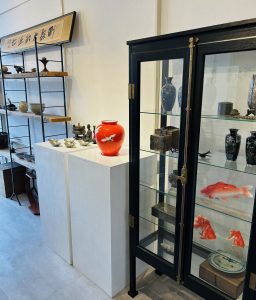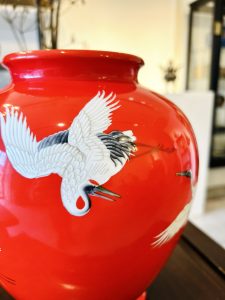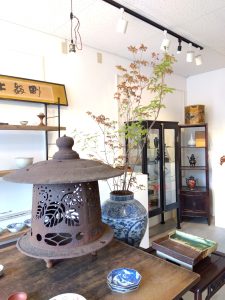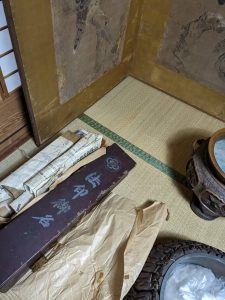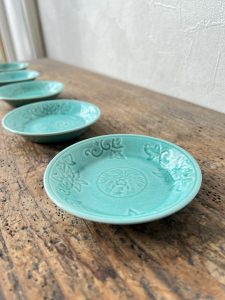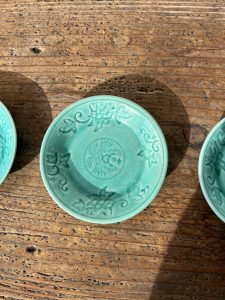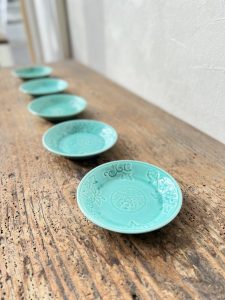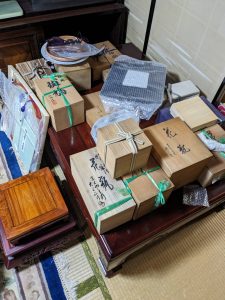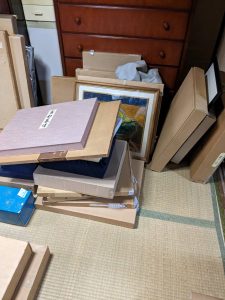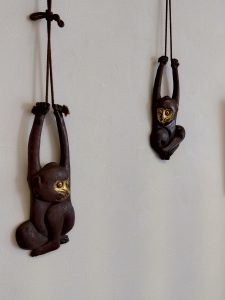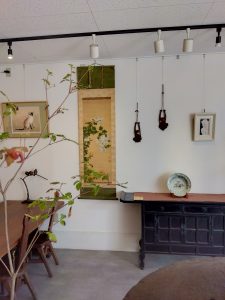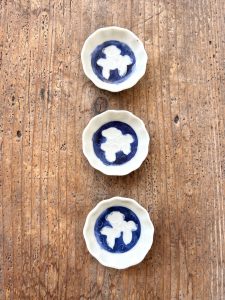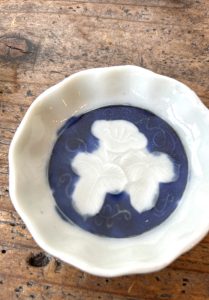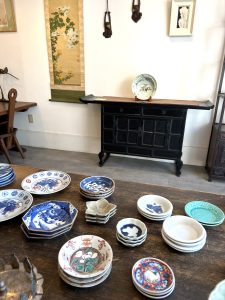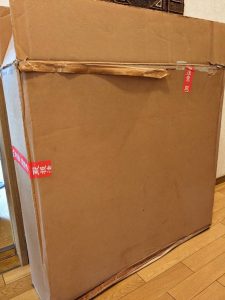みなさまこんにちは、スタッフHでございます。
今朝の冷たい風に寒い季節の到来を覚悟し、念のため暖房器具を出してみました。
さて私、最近視野が狭くなっているのか、体のあちこちを家具などにぶつけます。昔から視力は良いのですが、周囲をよく見ておらず、大きな変化にも気付かないことが多いのです。先日、ガラス棚の中のノリタケの金魚が、2匹から3匹に増えていることに気づき、えっ?いつから?と一人で焦っておりました。
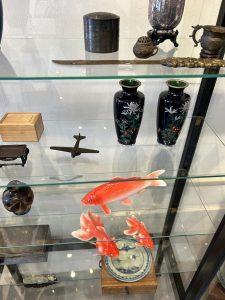
食器で有名なノリタケですが、多種多様な装飾となる置物も制作し、海外にも輸出しておりました。下の2匹は「琉金」でしょうか。改めて3匹の金魚を眺めてみると、水をまとっているかのような艶があり、ぷっくりしたお腹に触れたら本当にぷよぷよしているのではないかと思う質感で、ノリタケの確かな技術を感じます。
ノリタケについて調べていたのですが、いつのまにか金魚の歴史にも興味が湧いてしまいました。しばらく金魚の話にお付き合いください。
金魚は今から約2000年前に中国南部地方で野生のフナが突然変異を起こし赤色になったものが発見されました。これを原種として選別淘汰や品種改良の末、現在の金魚に至ります。写真上の金魚が原種に近いかもしれませんね。
その後時間をかけて更に品種改良が進められ、明代には品種も増え、皇帝、皇族、貴族らによって飼育、愛玩されてきましたが、1966年から始まった文化大革命においては「旧文化」として非難、破壊の対象となり、金魚の養殖は一度断絶しています。中国で金魚の養殖が復活したのは文化革命後で、革命前に日本に渡っていた金魚を親魚として再生産が始まり現在に至ります。
諸説ありますが、日本には室町時代中ごろに中国から和金が入ってきたというのが定説のようです。金魚の名前の由来も諸説ありますが、金魚(ちんゆう)の発音が金余(ちんゆう)と同じで金運をもたらす魚とされ、金魚と名づけられたともいわれています。
そして江戸中期になると、藩士が副業として金魚養殖を始めます。この流れに火が付き大量生産されるようになると価格が下がり、瞬く間に庶民に広まり、江戸時代には金魚ブームが起こったとか。当時はガラスがなく陶器に入れて上から見るのが主流のスタイルでした。この「上見(うわみ)」こそが金魚の正しい鑑賞法だともされています。花のように開く「尾びれの揺れの美しさ」が最大の見どころだそうです。
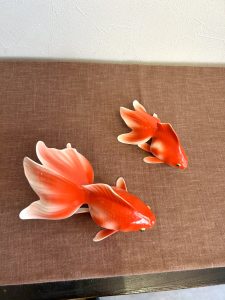
そして日本の金魚がアメリカに初めて輸出されたのは1878年、鑑賞用の金魚として琉金、出目金、ランチュウ、キャリコなどが人気だったようです。アメリカでも改良が進み「コメット」が生まれ、さらにイギリスに渡り「ブリストル」が生まれました。
金魚は魚類の中ではかなり多い約7万個の遺伝子を持っていることが分かっており、こうした遺伝子の組み合わせにより多様な品種の誕生につながってと考えられています。
あまりに馴染み深くて、可愛いな、綺麗だなとしか印象のない金魚でしたが、持ち合わせた遺伝子の多さと、人間の熱意や欲により変貌してきたのだなと、ノリタケの金魚を眺めがら考えておりました。
それでは、またお会いしましょう。
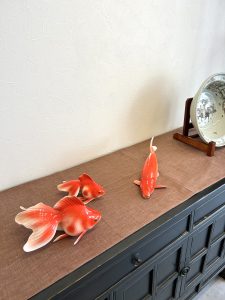
Hello everyone, this is Staff H.
The cold wind this morning made me prepare for the arrival of the cold season, so I took out the heater just in case.
I have been bumping my body against furniture and other things lately, as if my vision is getting narrower. I have always had good eyesight, but I don’t see my surroundings well and often don’t notice major changes. The other day, I noticed that the number of Noritake goldfish in the glass cabinet had increased from two to three, eh? Since when? I was so impatient.
Noritake is famous for its tableware, but the company also produced a wide variety of decorative ornaments and exported them overseas. The two goldfish below may be Ryukin. Looking at the three goldfish again, they are shiny as if they are covered with water, and their plump bellies have a texture that makes you think they are really plump when touched.
I was researching Noritake, but before I knew it, I became interested in the history of goldfish as well, so please bear with me for a moment as I talk about goldfish.
About 2,000 years ago, a wild crucian carp mutated into a red-colored goldfish in southern China. This was also the original species, and after selective selection and breeding, we have come to the goldfish of today. The goldfish in the photo above may be close to the original species.
However, during the Cultural Revolution that began in 1966, goldfish cultivation was condemned and destroyed as “old culture,” and goldfish cultivation was once discontinued. It was not until after the Cultural Revolution that goldfish farming was revived in China, and the fish that had been brought to Japan before the revolution were used as parent fish for reproduction.
There are various theories, but the most common theory is that wagane was introduced to Japan from China in the middle of the Muromachi period (1333-1573). The origin of the name “goldfish” is also the subject of various theories, but it is said that the name “goldfish” came about because the pronunciation of the word “chinyu” (金魚) is the same as “kinyu” (金余), which is believed to be a fish that brings good luck in the goldsmith’s field.
In the mid-Edo period, samurai of the feudal domain began to cultivate goldfish as a side business. This trend was sparked by the mass production of goldfish, which lowered the price and quickly spread to the general public, creating a goldfish boom in the Edo period. At that time, there was no glass, and the mainstream style was to put them in ceramics and view them from above. It is said that this “uwami” view is the proper way to appreciate goldfish. The beauty of the swaying tail fin, which opens like a flower, is the main attraction.
Japanese goldfish were first exported to the United States in 1878, and Ryukin, Demekin, Ranchu, and Calico were popular as goldfish for appreciation. Improvements were made in the U.S., and the “Comet” was born, followed by the “Bristol” in England.
It is known that goldfish have about 70,000 genes, which is quite a large number among fish, and it is thought that the combination of these genes led to the birth of a variety of breeds.
Goldfish are so familiar to us that we only have an impression of them as cute and beautiful, but I was thinking about the many genes they have and how they have been transformed by human enthusiasm and greed as I looked at the Noritake goldfish.
I hope to see you again soon.
ご実家の整理やお片付けなどをされている方のご相談などが多くございます。
お片付けなどくれぐれもご無理のないようになさってくださいませ。
風光舎では古美術品や骨董品の他にも絵画や宝石、趣味のお品など様々なジャンルのものを買受しております。
お片付けをされていて、こういうものでもいいのかしらと迷われているものでも、どうぞお気軽にご相談下さいませ。
また風光舎は、出張買取も強化しております。ご近所はもちろん、愛知県内、岐阜県、三重県その他の県へも出張いたします。
まずは、お電話お待ちしております。
***************************************
愛知県名古屋市千種区姫池通
骨董 買取【古美術 風光舎 名古屋店】
TEL052(734)8444
10:00-17:00 OPEN
#出張買取#骨董#古美術#骨董品#絵画#版画#茶道具#刀剣#彫刻




